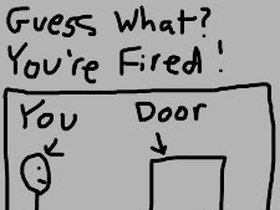Season Two, Episode Seven. Podcast recap! (And if you missed the podcast, you can find it here.)
Podcast Recap: Season 2, Episode 7
This week on the podcast, which is our final episode of Season 2, we talk about things you should consider when you need to fire someone, either from their job or contract, from a project, or from, well, anything really.
Please note that we are NOT HR professionals or lawyers, so in our podcast and in this blog, we are focused more on the emotional burden of firing someone vs. the legal and technical logistics. Often, organizations have people to help with this and make sure that no one gets in trouble or does something horribly wrong. There is definitely due process that is required, and if you find yourself needing to fire someone, you need to ensure you’ve reached out to the right people before you actually say the words.
Like all things that are new or challenging, firing someone in the most effective and sensitive way requires some preparation. In addition to reaching out to your employment lawyer and/or your HR department, you might consider:
Before the Conversation
- Have you given the person a chance to improve?
- If you’re firing someone because of poor performance, you need to be able to show that you’ve been clear with your expectations, you’ve had regular performance conversations, and you’ve actually given the person a chance to improve.
- Remember that the onus is on you to hold regular performance management conversations so that really, this isn’t a surprise to anyone. (Except those who may be deliberately obtuse.)
- Have you documented your conversations?
- Of course as part of a formal due process there are verbal warnings and written warnings and all kinds of documentation. We also recommend that you keep your own private and more casual notes on your discussions and important events. This can be used as evidence of your efforts to help the employee improve, your conversations, their reactions, etc.
- Have you planned what you’re going to say?
- Consider the ASBI tool so that you can open well, state the issue, and then BE QUIET. The temptation is to keep talking and fill the silence, and that just doesn’t help anyone (and could dig you into a hole).
- Be firm and kind. If you’re over emotional, you risk the conversation going sideways and losing control of what is happening. If you’re unemotional, you risk sounding like a cold hearted robot.
- If you’re firing someone because of a poor fit (vs. for poor performance), all the same preparation applies. Have you given them a fair chance to fit in? Have you chatted with them and coached them to allow them to adjust? Have you planned how you’re going to say what you need to say?
During the Conversation
Think about having a mantra to use if you get a bunch of questions or arguments against the termination. You might consider:
- I appreciate this is a difficult or frustrating thing to happen. As I stated, you are being released from this position, and here are the next steps…
- I appreciate your perspectives, and here is what is happening…
- I know this is upsetting. Here is what you can expect next…
Picking a mantra that is true, does not apologize, and does not admit to any mistakes, is critical. It allows you to repeat the message over and over as the person tries to process what’s going on. Remember, this conversation is not a debate.
After the Conversation
Follow up. It might be with the person or with HR or with a variety of other people. Ensure that the proper next steps have been taken – leaving it up to chance or process is a recipe for confusion and, if things don’t happen in the right way (for instance, owed pay is not issued), it makes a bad situation worse, and makes you look terrible.
Our Three Tips
- Prepare Prepare Prepare:
- Before the conversation – document and give them a chance to improve or fit in
- During the conversation – have a mantra to stay on course and avoid a debate
- After the conversation – follow up on the promised next steps, and do a little self assessment of how it went and lessons learned
- Use ASBI with Just the Right Amount of Emotion
- Open Well
- Be Firm but Kind
- Don’t Fill the Silence
- Deal with Dissention
- Stick to the Talking Points
- Refuse to Debate
- Use Your Mantra
This may be the hardest of our Difficult Conversations – after all, we are talking about someone’s livlihood! Do your homework so you can get it as right as possible the very first time! Likely you will think back and wish you had done something differently. And that’s ok.

